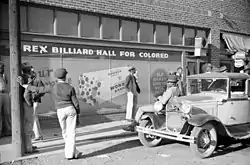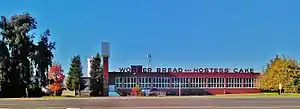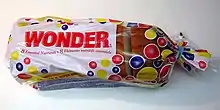Wonder Bread
Wonder Bread is a brand of sliced bread which originated in the United States in 1921 and was one of the first to be sold pre-sliced nationwide in 1930.[2] The brand is currently owned by Flowers Foods in the United States.[3]
 The original logo that was used from 1988 to 2005 | |
| Product type | Sliced bread |
|---|---|
| Owner | Flowers Foods |
| Country | U.S. |
| Introduced | May 21, 1921[1] |
| Markets | United States |
| Previous owners | Taggart Baking Company (1921–1925) Continental Baking Company (1925–1995) Interstate Bakeries Corporation (1995–2012) |
| Website | wonderbread.com |
History

The Taggart Baking Company of Indianapolis, Indiana, began producing Wonder Bread that debuted on May 21, 1921,[4] following a blind promotion with ads that only stated a "Wonder" was coming on that date. The brand was named by vice president for merchandising development Elmer Cline, who was inspired by the International Balloon Race at the Indianapolis Motor Speedway.[5] Cline was filled with "wonder" by the scene of hundreds of balloons creating a kaleidoscope of color resulting in the iconic red, yellow and blue balloons featured on the Wonder Bread logo.[2] The logo was designed by commercial artist Drew Miller while he was on staff at a Chicago ad agency.[5]
Continental Baking Company purchased Taggart in 1925.[6] This made Wonder Bread a national brand and added "It's Slo Baked" to the logo.[7] In the 1930s, Continental Baking began marketing Wonder Bread in sliced form nationwide, one of the first companies to do so; this was a significant milestone for the industry and for American consumers, who, at first, needed reassurance that "wonder-cut" bread would not dry out.[2] The W. E. Long Company of Chicago, which had formed a cooperative of bakeries to market Holsum Bread, had pioneered and promoted the packaging of sliced bread two years prior, in 1928.[8]
Wonder Bakery Exhibit, in The Food Zone, 1939 New York World's Fair by Continental Baking Company had a wheat field, the first in 68 years, in New York City.[9]
Unsliced bread returned for a period during World War II due to an industry-wide slicing suspension in 1943.[10] Bread slicers returned two months later.[2][11][12]

During the 1940s, Continental Baking began adding vitamins and minerals to Wonder Bread as part of a government-sponsored program of enriching white bread, which was notoriously deficient in vitamin and mineral content, to combat certain diseases. Wonder was also the first national bread brand to feature open dating and nutrition information on its packaging.[2] In the 1950s, Wonder Bread further expanded advertising of its nutrient enrichments. The company sponsored Howdy Doody, with host Buffalo Bob Smith telling the audience, "Wonder Bread builds strong bodies 8 ways" referring to the number of added nutrients.[13] By the 1960s, Wonder Bread was advertised with the slogan "Helps build strong bodies 12 ways," with a list of health claims.[13] In 1986, Continental introduced the lower-calorie Wonder Light bread.
Interstate Bakeries Corporation, later known as first Hostess Brands company (Old HB), purchased Continental Baking in 1995. In 2004, Interstate Bakeries declared bankruptcy, putting the future of Wonder Bread in some doubt. In February 2009 Interstate Bakeries emerged from bankruptcy marking a "new beginning" for the baking company.[14]
In 2006, Wonder was one of the first bread brands to introduce whole grain white breads in an effort to appeal to consumers who loved the taste of white bread, but were looking for more nutrition.[15] These breads were made with an albino wheat variety that does not have the more pronounced taste of whole red-wheat flour.[16]

On August 28, 2007, Interstate Bakeries announced it would soon end production of Wonder Bread in the Southern California market, leading to a loss of 1,300 jobs. This was due to a decline in sales, as Southern Californians in particular were partial to whole-grain breads and "premium" loaves.[17] As of September 2009, Wonder Bread and other Hostess Brands breads, such as Home Pride, returned to Southern California supermarkets in response to significant consumer demand. In connection with the re-introduction, the company donated thousands of loaves of bread to the San Diego Food Bank and the Los Angeles Regional Food Bank.[18]
In August 2009, Wonder reformulated its Wonder Classic and Wonder Classic Sandwich bread varieties to include more calcium and vitamin D.[19] Two slices of Wonder Classic and Wonder Classic Sandwich bread then provided 30% of the daily recommended intake of calcium, the same amount as 8 fluid ounces of whole milk. Wonder 100% Whole Wheat (16 oz variety) qualified for the Women, Infants and Children (WIC) program in most states. In March 2010, Wonder extended its line of bread products with Wonder Smartwhite, which had the taste and soft texture of white bread, but the fiber of 100% whole wheat bread.[20]
In 2011, Wonder bread launched its first national advertising campaign in years, titled "Always Wonder".
On November 16, 2012, Hostess Brands (Old HB) filed a motion in United States Bankruptcy Court for the Southern District of New York seeking permission to close its business and sell its assets under Chapter 11.[21] On November 16, 2012, Hostess Brands (Old HB) closed its United States plants and began liquidation proceedings, temporarily ending production of Wonder Bread in the states. Flowers Foods, owner of the Mrs. Freshley's, Tastykake and Dave's Killer Bread brands, announced that it signed an agreement to acquire Hostess' bread brands, including Wonder Bread, on January 11, 2013.[3] On July 22, 2013, Flowers Foods completed its $355 million acquisition of several breads, bakeries and other assets from the company previously known as Hostess Brands (Old HB), including Wonder Bread.[22] Flowers Foods announced on September 12, 2013, that Wonder Bread would return to U.S. store shelves, with delivery of Wonder Bread to stores resuming on September 23.[23]
In other countries
Mexico
Wonder Bread is produced in Mexico by Grupo Bimbo,[24] the largest baking company in the world.[25] Grupo Bimbo acquired the Mexican rights to the brand and factories in 1986 when it purchased the Mexican subsidiary of Continental Baking Company.[26]
In 2013, Grupo Bimbo lost in their bid to acquire Hostess bread brands, including Wonder Bread (U.S.), to Flowers Foods during the liquidation of Hostess Brands (Old HB).[27][28]
Canada

Wonder Bread in Canada is not a license from the United States, although the packaging is very similar. Wonder Bread began appearing on Canadian grocery shelves and home delivery routes as early as 1927. A product of Northern Bakeries Limited, the bread apparently made its debut in Montreal.[29] In 1928, Northern Bakeries Limited registered the "Wonder" trademark with the Canadian Intellectual Property Office. Two years later, Wonder arrived in Toronto, baked by Nasmiths Limited (founded 1850). Newspaper ads proclaimed "Great news for the people of Toronto – it's here at last – the delicious Wonder Bread." Made from unbleached flour and "Slo-Baked," Wonder was said to produce "more slices and thinner slices" when cut, yet would not crumble.[30] By 1934, "Sliced Wonder," an early version of sliced bread, was being promoted by the Ideal Bread Company Limited of Toronto, with no fewer "than 26 slices in a loaf".[31]
By 1940, Wonder Bakeries Limited had become the maker of Wonder Bread in Canada after acquiring Ideal Bread in 1938,[32] along with Hostess cakes and cookies, although local bakers continued to be the actual manufacturers. New products were introduced that included Wonder Melior, "a better white bread with natural wheat vitamins," as well as Wonder Peter Pan Bread, designed to appeal to children.[33][34] Wonder Bakeries also became the maker of Hollywood Bread, marketed for those "counting calories" and trying to keep their "figure".[35]
During the 1960s, General Bakeries Limited became the maker of Wonder. Then, in July 1985, Weston Bakeries Limited, a subsidiary of George Weston Limited, acquired certain Ontario assets of General Bakeries, then owned by Dominion Stores Limited, that included not only bread and roll plants but also the trademark for Wonder in Canada.[36]
Between 2000 and 2022, Weston Foods added a number of new Wonder products to the brand's line-up, many of which were designed to appeal to parents and their concern for their children's nutritional needs. In 2011, Weston Bakeries Limited announced that its Wonder Bread brands would henceforth be free of artificial preservatives, artificial colors, or artificial flavors.[37]
In 2022, the brand was sold by Weston Foods to FGF Brands and now operates as Wonder Brands Incorporated.[38]
Pakistan
Wonder Bread is present in Pakistan. It is not connected with the American brand. The company was established in 1983 in Karachi. Today, in addition to Karachi, it is also present in Faisalabad, Islamabad, Lahore, Peshawar, and Quetta.
Morocco
Wonder Bread is planning to enter the African market through Morocco. It is not connected with the American brand. The company is planning to be established in 2022 in Casablanca. In addition to Morocco, it will also be present in Egypt, Nigeria, Kenya, and South Africa.
References
- About us on brand website
- The Wonder Bread Cookbook. Berkeley, California: Ten Speed Press. 2007. pp. 3–7. ISBN 9781580088077. Retrieved January 5, 2019.
the wonder cookbook.
- "Our Brands". Flower Foods. Retrieved January 5, 2019.
- Miller, Allison (21 May 2021). "Reliving the Wonder Years of Wonder Bread". JSTOR Daily. ITHAKA. Retrieved 28 March 2022.
- "The History Of Wonder Bread In The United States". Where Food Comes From. Archived from the original on 24 July 2013. Retrieved 28 March 2022.
- "Carolyn Wyman on the History of Wonder Bread". To the best of our KNOWLEDGE. Archived from the original on 1 August 2016. Retrieved 28 March 2022.
- Cross, Mary (2002). A Century of American Icons: 100 Products and Slogans from the 20th-Century Consumer Culture. Greenwood Press. pp. 68–70. ISBN 978-0313314810. Retrieved 4 September 2020.
- "History". Holsum. Archived from the original on January 10, 2007. Retrieved January 5, 2019.
- Van Dort, Paul M. "Wonder Bread, Continental Baking, The Food Zone". 1939 New York World's Fair. Retrieved 28 March 2022.
- Kelly, Kate (27 October 2021). "Wonder Bread: The Most Famous White Bread". America Comes Alive. Retrieved 28 March 2022.
- "A Visual History of Wonder Bread". Cluster Mag. Archived from the original on 20 October 2012. Retrieved 28 March 2022.
- Schultz, Colin. "The Life And Death of Wonder Bread". Smithsonian Magazine. Retrieved 28 March 2022.
- Kelly, Kate (27 October 2021). "Wonder Bread: The Most Famous White Bread". America Comes Alive. Retrieved February 26, 2022.
- Stagemeyer, Suzanna (February 3, 2009). "Interstate Bakeries emerges from bankruptcy". Kansas City Business Journal. Archived from the original on February 18, 2009. Retrieved April 25, 2011.
- Weise, Elizabeth (June 29, 2005). "Wonder what's next? Whole-grain white bread". USA Today. Archived from the original on February 4, 2012. Retrieved April 25, 2011.
- Pace, Gina (January 22, 2006). "Wonder Bread To Offer Whole Wheat". CBS News. Archived from the original on March 24, 2010. Retrieved April 25, 2011.
- Hirsch, Jerry (November 20, 1986). "Baker slicing production". Los Angeles Times. Archived from the original on August 30, 2007. Retrieved April 25, 2011.
- "Back by Popular Demand, Wonder® and Home Pride® Breads Return to Southern California Market" (Press release). Interstate Brands. July 15, 2011. Archived from the original on October 11, 2012. Retrieved April 25, 2011 – via Prnewswire.com.
- Schroeder, Eric (August 13, 2009). "Wonder Classic to include more calcium and vitamin D". Baking Business. Retrieved January 5, 2019.
- "America's Best Selling Brand Of Bread Introduces Wonder® Smartwhite™" (Press release). Wonder Bread. March 29, 2010. Archived from the original on April 7, 2010. Retrieved January 5, 2019 – via Prnewswire.com.
- Palank, Jacqueline (January 12, 2012). "Twinkies Maker Hostess Files for Chapter 11 Protection". The Wall Street Journal. Archived from the original on March 31, 2015. Retrieved January 11, 2012.
- "Breads to return to shelves as Hostess deal set". USA Today. Associated Press. July 22, 2013. Archived from the original on December 21, 2014.
- "Wonder, other bread brands returning to supermarket shelves". Detroit Free Press. Associated Press. September 23, 2013. Archived from the original on September 27, 2013. Retrieved January 5, 2018.
- "Grupo Industrial Bimbo History". Funding Universe. Archived from the original on December 31, 2012. Retrieved July 20, 2012.
- Leek, Martyn (July 31, 2012). "Sales up, profits down at Grupo Bimbo". British Baker. Archived from the original on October 18, 2015.
- "Company Search – Company Information". Hoover's Company Profiles. Archived from the original on 2013-01-25.
- Brodeki, Joan (January 7, 2013). "Wonder Bread may be purchased by major Mexican retailer Grupo Bimbo". Retail Dive. Retrieved January 24, 2022.
- Isidore, Chris (March 1, 2013). "Flowers Foods buys Wonder Bread from Hostess". CNN Money. Retrieved January 24, 2022.
- "United in service to the public (advertisement)". Toronto Daily Star. June 16, 1927.
- "Great news for the people of Toronto (advertisement)". Toronto Daily Star. October 7, 1930.
- "Trust kiddies to know what's good (advertisement)". Toronto Daily Star. October 12, 1934.
- "To designate the property at 183 Dovercourt Road (Ideal Bread Company Factory) as being of architectural value or interest" (PDF). Retrieved 2023-09-26.
- "Missed for generations". Toronto Daily Star. September 23, 1940.
- "As thrilling as a Peter Pan adventure (advertisement)". Toronto Daily Star. October 23, 1943.
- "It's no trick to keep your figure (advertisement)". Toronto Daily Star. June 1, 1960.
- "Wonder Bread". Investor's Digest. December 24, 1985.
- "Weston Bakeries unveils new recipes for iconic brands". Canadian Manufacturing. August 29, 2011. Archived from the original on September 27, 2013. Retrieved October 1, 2012.
- "George Weston Limited announces the Closing of the sale of its Weston Foods Fresh and Frozen Businesses". CNW Group Limited. December 10, 2021. Retrieved January 24, 2022.